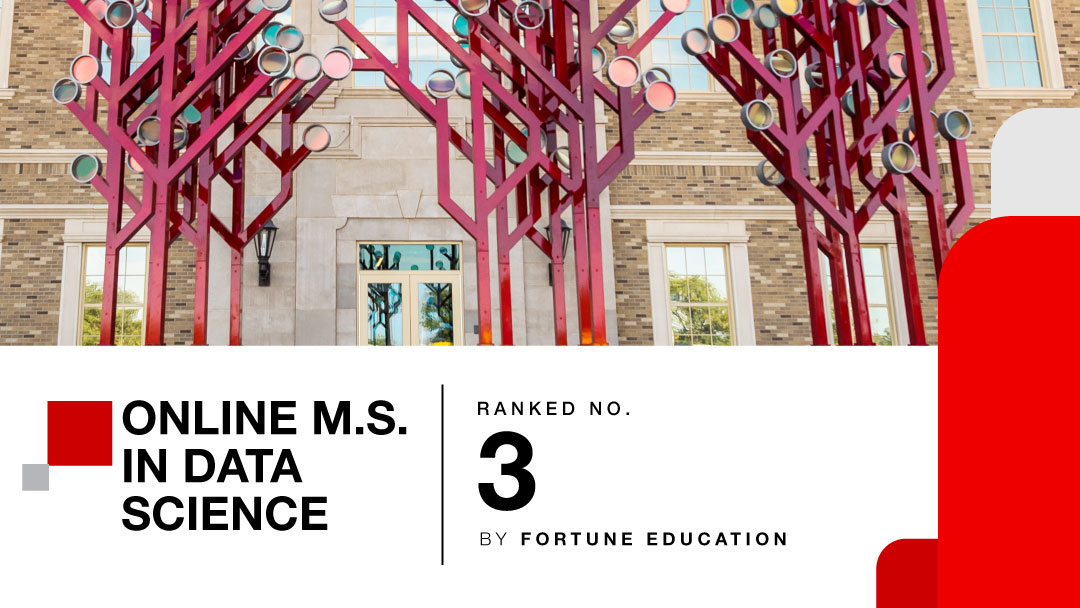
The MSDS program also recently ranked No. 21 on the 2022 Best Online Non-MBA Master’s in Business Programs list by U.S. News & World Report.
The Master of Science in Data Science (MSDS) program at the Jerry S. Rawls College of Business was ranked No.3 on the “Best Online Master’s in Data Science Programs in 2022” list by Fortune Education. This marks a major milestone for the Online MSDS program, which started in 2018.
“Within a short period of time, the faculty have developed a program that provides a direct path to challenging, well-compensated jobs and careers in data science,” said Margaret L. Williams, dean of Rawls College. “Faculty deserve the credit for building this excellent program by constantly updating their skills, understanding the needs of business, and bringing state-of-the-art technical skills into the classroom.”
Fortune created the rankings list in response to the rapid exponential growth and demand for data scientists. This is the first ranking of online data science graduate programs by Fortune.
“Our MSDS program is practical and teaches state-of-the-art analytical tools that are in high demand in the industry,” said Mayukh Dass, James L. Johnson Chair of Business Administration and associate dean of graduate programs and research for Rawls College.
According to the U.S. Bureau of Labor Statistics (BLS), data science-related jobs are projected to grow 28% per year. The BLS also projects an average wage of $103,930 for data scientists.
To meet the booming industry demands, the Online MSDS program helps students become highly-skilled data scientists.
The program seeks to equip students with a rich set of big data and machine learning tools to become more competitive in the job market.
Graduates in the Online MSDS program will leave having developed essential hard and soft data science skills. These crucial skills help companies derive value through big-data strategy, choice of technology and business analytics.
Jaeki Song, Area Coordinator of ISQS and Jerry S. Rawls Professor of MIS, credits the role the faculty members have played in the Online MSDS program. This is especially true for their work in the Big Data Consortium, which started in 2009. Every spring semester, the Area of ISQS hosts the event to identify industry trends, to conceive opportunity strategies and to form collaborations across industry and academia.
“Through this involvement [with the Big Data Consortium], our faculty members have emerged as award-winning teachers and recognized research scholars,” said Song. “In fact, over the past 10 years, our faculty has ranked among the top universities worldwide for research published in top-tier journals.”
The 36-hour MSDS program helps students learn how to manage, analyze and understand complex data and make strategic recommendations to help solve problems for organizations. The program is also STEM-designated, meaning students graduate with not only business acumen, but also skills in the areas of science, technology, engineering and math. Students can enroll in a one- or two-year program, and while the one-year program is offered both in-person and online, the two-year program is only available online.
There are two categories of students the Online MSDS program looks for: recent high-caliber STEM graduates who have not yet entered the job market and seek to build a career in data science and STEM-related professionals seeking to transition to data science job positions.
What students will get in return is a program that clearly sets itself apart from the competition. The curriculum is continuously updated and improved through the program’s technological advancements and interactions with alumni and advisory board members.
It can be hard for prospective students to find a program that covers the entire value chain of data science.
“But our program does,” said Song. “From big data strategy and business intelligence to advanced analytics and optimization, as well as offering state-of-the-art courses related to cloud technology and cyber-security.”
The application deadline for summer entry into the MSDS program is May 1. Prospective students can find more information on the MSDS program page.
Fortune Education Methodology
Fortune determined its rankings based on two components: Selectivity Score (85%) and Demand Score (15%).
Selectivity Score focused on the incoming class of MSDS students. Fortune looked at the average GPA of incoming students and the average number of years of work experience of those same students. Forbes also considered each program’s acceptance rate and gave stronger scores to programs that were challenging.
Forbes believed a more selective a program leads to a stronger cohort and more successful alumni and so put as much weight into Selectivity Score as it did.
Demand Score measured the total enrollment size of the program and the number of applicants for the most recent year. The thinking here was that by comparing the size of the student body to the applicant pool, Forbes could determine how much a program was in demand by potential students.
